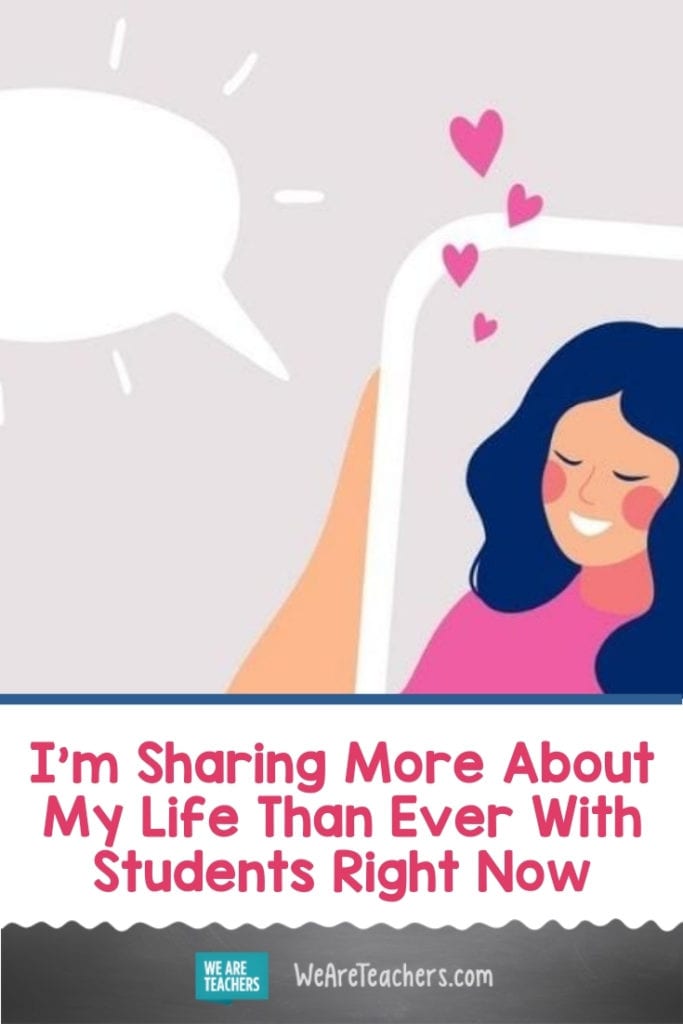I’m a writer and an English teacher, so I’ve always used personal stories to connect with people, especially my students. When we read To Kill a Mockingbird, I talk about my Ewell-like childhood neighbors. During The Outsiders, I tell them about the brothers I went to school with who always reminded me of Soda and Ponyboy. It makes the kids realize that I’m a person, not just a teacher, and it models vulnerability and making connections to the text.
These stories usually came up in whole-class discussions … which are pretty impractical over Zoom. Maybe other people are having more luck with it, but we seem to spend half of any discussion saying, “Unmute! Unmute!” or waiting for the glitchiness to stop.
But now that I’m only seeing my students on a computer monitor, those personal connections are more important than ever.
The problem—well, one of many problems—is that my virtual lessons are incredibly scripted. The technology is so unpredictable that I feel like I have to be over-prepared for any possible scenario. So the idea of a topic just arising naturally is laughable, given the degree of planning that goes into any class. Additionally, I only see my kids for two 45-minute segments a week, so every one of those minutes has to count.
To recap: Stories matter more than ever. And there’s no way to work them in spontaneously.
So I’m doing some purposeful storytelling this year, and I think it’s working well. I opened the first class with my seventh graders by telling a story about my first day of third grade and the weird girl who sat beside me on the bus. In the second class, I made them laugh by explaining how I accidentally deleted myself from the faculty email list, lost access to all my own lesson plans, and then blamed it on the assistant principal. When we started a mental health unit last week, I talked a little about my own experiences with depression after my daughter was born.
I don’t really have a way to assess the effectiveness yet. My goals are qualitative—I want to develop relationships with my students, build a classroom community, and engage my students at the beginning of each lesson.
I know that correlation doesn’t equal causation, but I’ve noticed some positive signs.
My kids show up early for my online classes, and they’re almost all present every day. In their writing, they’re sharing stories about their families and their concerns, opening up in a way that normally takes a lot longer than two weeks of school. Multiple kids have reached out to me about concerns at home, even though I’m technically not the first person they should be contacting. This leads me to believe that my master plan to build trust and relationships is working.
It takes a lot more work than it used to.
Saturday or Sunday morning, I sit down and consider what themes, skills, or topics we’re studying on live instruction days in the coming week. Then I have a little solo therapy session where I try to remember my own experiences with whatever it is I want to focus on. The first week was all about the gifts of failure since everyone is currently struggling with distance learning. Last week was all about mental health and being able to accept help. Next week we’re doing a group project, and I’ve got plenty of stories about my experiences with those. (Honestly, maybe it’ll be a catharsis for the resentments I’m still holding onto!)
It takes some time and planning, and I definitely miss the spontaneity of my regular classroom lessons. However, purposeful storytelling also forces me to reflect on what I want my kids to get out of my class in terms of life skills and social-emotional learning. It requires me to be explicit about things like overcoming fears and having a growth mindset and taking risks, whereas before I think I would have been less clear about connecting those ideas to my curriculum.
Plus, I think the kids like it.
They smile when I get my spiral notebook and tell them it’s storytime, even though they’re twelve and think they’re too old. When I almost forgot that part of class during my third period last week, a student put a reminder in the chat. And sure, maybe they’re lying to me and only pretending to enjoy it. But if they care that much about my feelings this early in the semester, I’ll take that as evidence that storytelling is working.
What’s your thought on teachers sharing life stories with their students? Come and share in our WeAreTeachers HELPLINE group on Facebook.
Plus, why student-teacher relationships must come before literacy.

